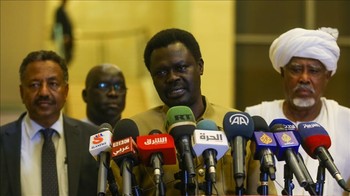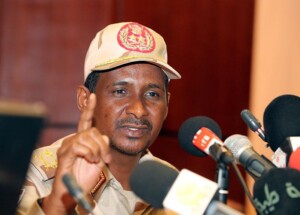Opposition parties reject ‘imminent’ agreement between Sudan’s military and civilian forces
The National Accord Forces (NAF) announced its total rejection of an alleged “bilateral settlement” between the Forces for Freedom and Change-Central Council (FFC-CC) and the military component of the government last week. The NAF, an FFC breakaway faction formerly called the Forces for Freedom and Change-National Accord (FFC-NA), lamented that the current bilateral statement does not represent all parties.
 Minni Minawi gives press statement (File photo)
Minni Minawi gives press statement (File photo)
The National Accord Forces (NAF) announced its total rejection of an alleged “bilateral settlement” between the Forces for Freedom and Change-Central Council (FFC-CC) and the military component of the government last week. The NAF, an FFC breakaway faction formerly called the Forces for Freedom and Change-National Accord (FFC-NA), lamented that the current bilateral statement does not represent all parties.
The agreement in question provides for a civilian prime minister and a 'government of competencies', but control over the proposed Security and Defence Council remains a point of contention. According to a UN statement on Friday, talks regarding solutions are ongoing.
According to the NAF statement, "a Sudanese-Sudanese dialogue is required to have a comprehensive solution, excluding no one but the National Congress.” The statement called for a Sudanese platform that is formed according to a credible mechanism agreed upon by all parties. The statement asserts that the current bilateral statement will not lead to a government of national and independent competencies, and it does not represent all parties.
On Friday, Volker Perthes, Special Representative of the United Nations Secretary-General in Sudan and head of the United Nations Integrated Transition Assistance Mission in Sudan (UNITAMS), revealed that talks between the military ad civilian counterparts regarding solutions are ongoing.
In an interview with Middle East News Network El Hadat, he said that there is a convergence of views between all parties regarding the exit from the crisis. Perthes expressed his hope that a solution is close, pointing out that there is an agreement between the parties on a transitional period of no more than two years.
He added that the atmosphere is much better than it was three months ago, stressing the importance of reaching a solution by consensus of all components, including the military. He stressed that the military should not be part of political institutions, adding that coup-leader and Sudanese Armed Forces (SAF) commander, Abdelfattah El Burhan, has “confirmed his readiness to leave political life.”
Both civilian and military sources confirmed to El Sharg news channel on Wednesday that El Burhan reached agreements with the FFC on many issues, but discussion is still ongoing with regard to some controversial points. An 'imminent agreement' document was issued after extensive meetings between the two parties in Khartoum.
The mainstream Forces for Freedom and Change have received criticism from other opposition groups because of their sympathy towards a power-sharing government with the military.
The NAF, formerly the National Accord breakaway faction of the Forces for Freedom and Change (FFC-NA), announced their political vision on August 23. In the document, it was proposed that the role of the military in the government should be limited to security and defence councils, chaired by a civilian head of state or the prime minister.
In Sudan, there is plenty of sceptisism around the military’s announced ‘withdrawal’. On October 5, Sudan’s Resistance Committees and Coordination Committees activated a separate document, the Revolutionary Charter for the Establishment of the People’s Authority.











 and then
and then